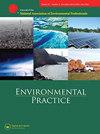Analyzing control, capacities, and benefits in Indigenous natural resource partnerships in Canada
Q3 Social Sciences
引用次数: 6
Abstract
ABSTRACT Our work analyzed Indigenous partnership arrangements and conditions associated with natural resource development, specifically, the capacities identified by Indigenous peoples needed to participate in resource wealth generation. The review was needed to take stock of previously understudied and new partnerships emerging in Canada’s rapidly growing natural resource sectors where cross-cultural collaboration is becoming a feature, and in some cases a requirement, of new ventures. Results illustrate nine categories of arrangements (i.e., land use/regional planning processes; IBAs; MOUs; Indigenous businesses, joint ventures; environmental assessments; revenue sharing; advisory committees; and regional economic councils) used by Indigenous communities and their partners to assert their control and derive benefits from natural resource extraction. These included highly formal and technical legal arrangements, such as Impact and Benefit Agreements, and less formal arrangements such as Memorandums of Understandings and advisory committees. Using the five capitals’ (social, human, financial, built, and natural) approach we also synthesized existing knowledge of partnership capacities and benefits. We found benefits in each of the five capital areas, most of which were forms of human capital. Employment (50%), improved decision making (46%), and also financial support (33%) were the top cited benefits. Results build to the conclusion that differences exist between capacities needed to start working together (pre-existing supporting conditions), and those built through collaboration (new or enhanced capitals as beneficial outcomes). Development models will produce more and sustainable benefits where capacity building is both an explicit process objective and outcome of new partnership designs.分析加拿大土著自然资源伙伴关系的控制、能力和效益
我们的工作分析了与自然资源开发相关的土著伙伴关系安排和条件,特别是土著人民参与资源财富创造所需的能力。这项审查需要对加拿大迅速发展的自然资源部门中以前未充分研究的和新出现的伙伴关系进行评估,在这些部门中,跨文化合作正在成为新企业的一个特点,在某些情况下是一种要求。结果显示了九类安排(即土地使用/区域规划程序;迁徙水鸟;备忘录;本土企业、合资企业;环境评估;收入共享;咨询委员会;和区域经济理事会)被土著社区及其伙伴用来维护其控制和从开采自然资源中获取利益。其中包括高度正式和技术性的法律安排,例如影响和利益协定,以及不太正式的安排,例如谅解备忘录和咨询委员会。利用五种资本(社会资本、人力资本、财务资本、建筑资本和自然资本)的方法,我们还综合了有关伙伴关系能力和效益的现有知识。我们在五个首都地区都发现了好处,其中大部分是人力资本的形式。就业(50%)、改善决策(46%)和经济支持(33%)是最受欢迎的好处。结果表明,开始合作所需的能力(已有的支持条件)与通过合作建立的能力(作为有益成果的新增或增资)之间存在差异。如果能力建设既是一个明确的过程目标,又是新伙伴关系设计的结果,那么发展模式将产生更多和可持续的效益。
本文章由计算机程序翻译,如有差异,请以英文原文为准。
求助全文
约1分钟内获得全文
求助全文
来源期刊

Environmental Practice
ENVIRONMENTAL SCIENCES-
CiteScore
0.90
自引率
0.00%
发文量
0
期刊介绍:
Environmental Practice provides a multidisciplinary forum for authoritative discussion and analysis of issues of wide interest to the international community of environmental professionals, with the intent of developing innovative solutions to environmental problems for public policy implementation, professional practice, or both. Peer-reviewed original research papers, environmental reviews, and commentaries, along with news articles, book reviews, and points of view, link findings in science and technology with issues of public policy, health, environmental quality, law, political economy, management, and the appropriate standards for expertise. Published for the National Association of Environmental Professionals
 求助内容:
求助内容: 应助结果提醒方式:
应助结果提醒方式:


